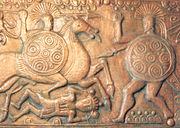- Maedi
-
"Medi" redirects here. For other uses, see Medi (disambiguation).
The Maedi (also Maidans, Maedans, or Medi), (Ancient Greek Μαῖδοι) were a Thracian or Illyrian[1] tribe, which in historic times, occupied the area between Paionia and Thrace, on the southwestern fringes of Thrace, along the middle course of the Strymon, between the Kresna Gorge and the Rupel Pass (present-day south-western Bulgaria).[2][3][4] Their capital city was Iamphorynna[5] which lay somewhere in the southwest corner of what is now Bulgaria.[6] Some scientists posit it in the area between the cities of Petrich and Sandanski, but its exact location remains unknown.[7] They were an independent tribe through much of their history, and the Thracian king Sitalkes recognized their independence, along with several other warlike "border" tribes such as the Dardani, Agrianes, and Paeonians, whose lands formed a buffer zone between the powers of the Odrysians on the east and of Illyrian tribes in the west, while Macedon was located to the south of Paeonia. The ancient historian and biographer Plutarch describes Spartacus as "a Thracian of nomadic stock", referring to the Maedi. Plutarch also says Spartacus' wife, a prophetess of the same tribe, was enslaved with him.
In 89–84 bc (during the First Mithridatic War), the Maedi overran Macedon, looted Dodona[citation needed], and sacked Delphi[8] as allies[citation needed] of Mithridates. It is said that they made a habit of raiding Macedon when a king of Macedon was away on a campaign [9].Sulla after this ravaged[10] the land of the Maedi. Aristotle recorded that bolinthos was the Maedan word for a species of wild Aurochses or Wisents that lived in the region.
A number of Maedi emigrated to Asia minor and were called MaedoBythini[11] (Greek: Μαιδοβίθυνοι).
References
- ^ The Cambridge ancient history, Volume 3, Part 2 by Iorwerth Eiddon Stephen Edwards, pg.278
- ^ The Spartacus war, Barry S. Strauss, Simon and Schuster, 2009, ISBN 1416532056, p.31.
- ^ The Cambridge Ancient History: pt. 1. The prehistory of the Balkans; and the Middle East and the Aegean world, tenth to eighth centuries B.C, Cambridge University Press, 1982, p. 601.
- ^ The Assyrian and Babylonian empires and other states of the Near East, from the eighth to the sixth centuries B.C., Volume 3, John Boardman, Cambridge University Press, 1991, ISBN 0521227178, p. 601.
- ^ Livy: History of Rome, VII, Books 26-27 (Loeb Classical Library No. 367) by Livy and Frank Gardner Moore, 1943, page 96: "...waste the country and to besiege the city of Iamphorynna, the capital and citadel of Maedica..."
- ^ Hannibal's war: a military history of the Second Punic War, John Francis Lazenby, University of Oklahoma Press, 1998, ISBN 0806130040, p.162.
- ^ М. Манов. Ямфорина или Форуна? Опит за проблематизация и локализация. – Археология, 2004, кн.1-2, 107-112.
- ^ The Oxford Companion to Classical Literature (Oxford Companions) by M. C. Howatson, 2006, ISBN 019860081X, page 73: "... of 89-85, when Athens, which had sided with *Mithridates, was sacked and in part destroyed by the Roman general *Sulla [...] Greece suffered severely, both from Sulla and from the barbarian allies of Mithridates, who sacked Delphi..."
- ^ Titus Livius, "...into Macedonia and thence into Thrace and against the Maedi [...] that tribe had been in the habit of making raids into Macedonia, whenever it knew that the king was engaged in a foreign war and the kingdom unprotected."
- ^ Plutarch, Sulla, "Upon these assurances Sulla sent him away, and then himself invaded the country of the Maedi and after ravaging the most of it..."
- ^ The Cambridge Ancient History, Volume 3, Part 2: The Assyrian and Babylonian Empires and Other States of the Near East, from the Eighth to the Sixth Centuries BC by John Boardman, I. E. S. Edwards, E. Sollberger, and N. G. L. Hammond, ISBN 0521227178, 1992, page 601: "Earlier certain tribes of the Maedi emigrated to Asia minor were they were known by the name of the MaedoBythini..."
See also
- List of Thracian tribes
- List of Illyrian tribes
- List of ancient Thracian kings
- List of ancient Thracian cities
- Spartacus
Illyrians-related topics Culture Tages · Daunian pottery · Messapian pottery · Peucetii pottery · Devollite pottery · Gradistë belt-plate · Trebeništa masks · Vače situla · Vače belt-plate · Soleto Map · Monte Saraceno woman · Illyrian religion · Illyrian clothing · Illyrian coinage · Illyrian fibulae · Spectacle brooch · Daunian stele · ]
]Warfare Illyrian Wars · Alexander's Balkan campaign · Great Illyrian Revolt · Sica · Sibyna · Illyrian type helmet · Enchele kingdom · LembosLanguage Cities Categories:- Ancient tribes in the Balkans
- Ancient Blagoevgrad Province
- Illyria
- Thracian tribes of Macedonia
- Ancient tribes in Thrace
- Ancient tribes in Bulgaria
- Ancient Thrace stubs
Wikimedia Foundation. 2010.

